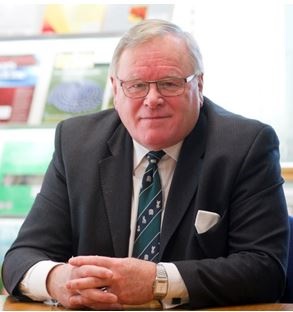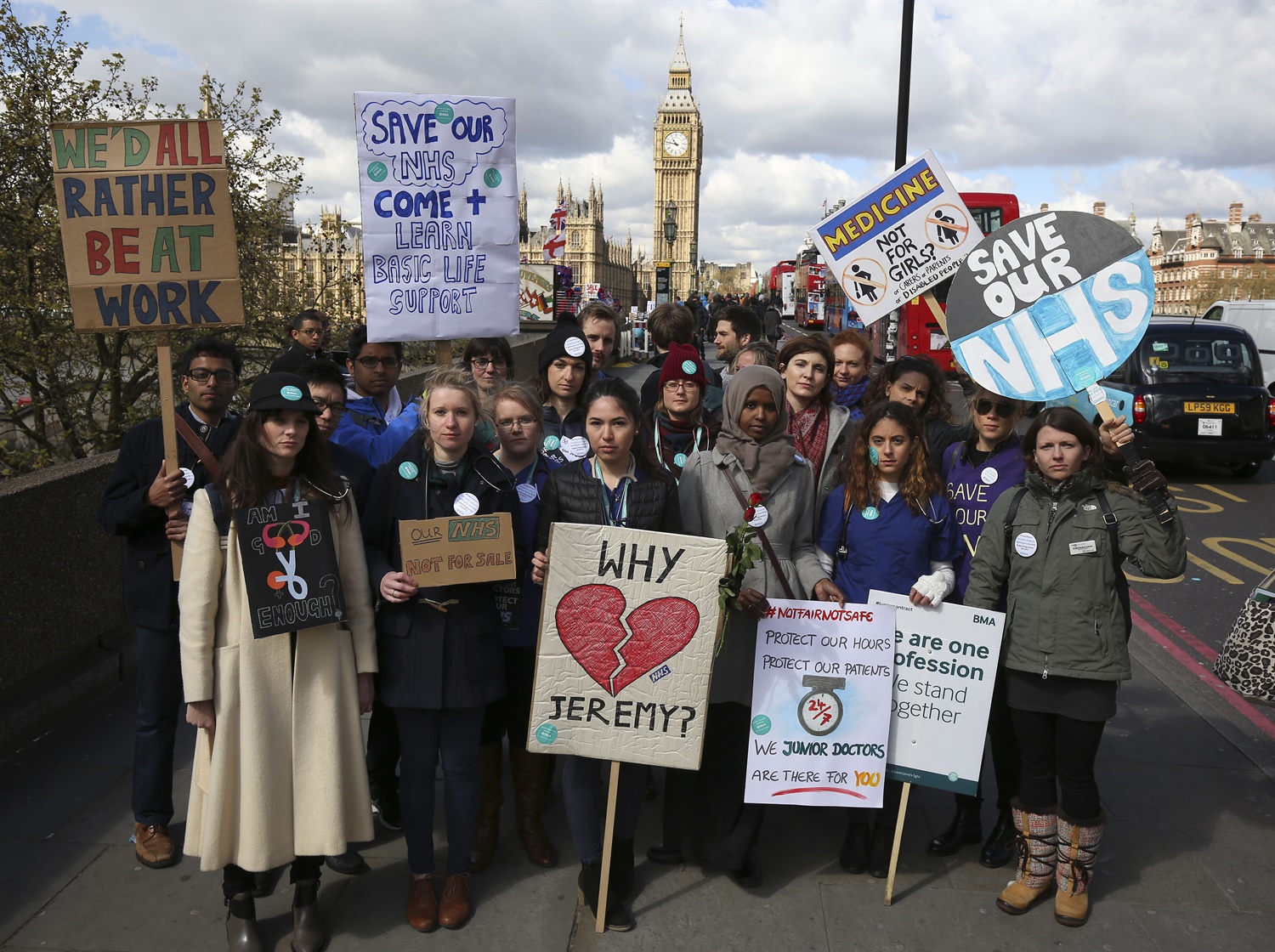29.04.16
Addressing the April 2016 NHS Crisis
 Emeritus Professor W Angus Wallace discusses how the current situation with junior doctors is in danger of destroying the NHS as we know it.
Emeritus Professor W Angus Wallace discusses how the current situation with junior doctors is in danger of destroying the NHS as we know it.
The National Health Service is a treasure created in 1948, that we all wish to preserve. This week has been one of the saddest weeks ever for the NHS but what is happening was totally predictable. In 2009 I wrote in the National Health Executive (NHE) Journal, with Clare Marx (now President of the Royal College of Surgeons of England) an article on “Orthopaedic training - Time for change” Sep-Oct09 p34-5. Eighteen months later we published a second article in the NHE on “Reconfiguring T&O Services in the UK” Jan-Feb 2011 p16-17. In that second article we flagged up that “if we do not address the issue (of re-configuring Trauma & Orthopaedic services) the service is in danger of imploding” and our prediction, made in 2011, that we were heading for an implosion has now happened.
The stress and pressures on the doctors have caused them to react, and with good reason. The junior doctors have seen their life/work balance significantly affected by the long hours and the stresses they are currently placed under in our National Health Service. The BMA have not been good at highlighting why the new contract being offered is unrealistic – the contract is not offering most junior doctors a 40 hour week (when 37.5 hours is the national norm) but the contract is asking our young surgeons to sign up for an obligatory 48 hour week for six years with very limited ability to control which hours or shifts they work. These doctors have looked at the details of the new contract and have realised the NHS Employers proposed rotas and shift systems cannot work unless the doctors are signed up for at least 46 to 48 hours per week. In addition, the doctors have little or no control over the rotas or shifts they are asked to work and they will have little or no option over which weeks they are allocated for annual leave. This means that those with children will have major child care issues and they may not be able to organise their annual leave to fit in with school holidays. The general public are only just beginning to realise that “junior doctors” actually mean doctors aged between 23 and 45 – just the age when these doctors are developing their home life, having their families and bringing up their children.
The Goal of a 7 Day Health Service – the Government’s Holy Grail
The government has dictated that changes must take place to provide an NHS which has an equal service seven days per week. Unfortunately the NHS is not like a car plant with a conveyor belt working all the time, it is much more complex and working in the NHS is much more irregular, unpredictable and stressful. There is no other health system in the world that runs an equal system seven days of the week and even in Hong Kong, which I know well, the system has migrated from a six-day per week service towards a five-day service as Chinese hospital staff have become more protective of their own weekends for leisure. The government has still not described exactly what they mean by an equal seven-day service and until they do it is going to be very difficult for hospital managers to work out what is to be expected of them. We are all also aware that there is insufficient funding to provide such a service despite the platitudes coming from the Department of Health and the government.
The Junior Doctors and a 7 Day Service
Unfortunately, the secretary of state for health has used the seven-day health service goal as one of the criticisms of the junior doctors when the junior doctors are the one group of hospital staff who have been delivering this service for the past 20 years. If you go into hospitals at the weekend you will not find any hospital secretaries or managerial teams. You will find a skeleton staff of senior management, porters, radiographers, pharmacists and laboratory staff etc, but the junior doctors will be there providing good care with some supervising consultants.

Why on earth has the secretary of state attacked the junior doctors over the seven-day week, when it is actually this group of workers who have been most committed to working their weekends for the NHS. This attack has resulted in doctors who have been working so hard becoming disheartened, feeling unloved and now totally alienated. We know there is an increased hospital mortality at the weekends but this is most likely to be principally related to case mix i.e. sicker patients admitted at the weekends, but also a lack of access to x-ray scanners, laboratory tests and even porters – these are the most important restrictions at weekends and these deficiencies have been ignored or purposely side-lined by the government in their discussions. I do not believe it is the junior doctors that are the problem in relation to the weekend mortality figures.
Can the current NHS Crisis be resolved?
We have reached today’s crisis point because of an unachievable political philosophy, excessive government pressure on NHS Employers who were tasked to deliver the impossible and employment terms which are more reflective of a dictatorial than a caring employer. I believe that both the government and the BMA have made fundamental mistakes in their negotiations and there has been a serious lack of understanding about what the new contract means to the work/life balance of doctors in 2016.

If the new contract is enforced many doctors will leave the profession or the country and the NHS will enter a new crisis. In the previous conflict in the 1970s our best doctors left the country for Canada, Australia, New Zealand and America. They were replaced by very committed and good doctors from overseas, particularly India and Pakistan all of whom spoke good English. This time the good doctors will leave and be replaced by Eastern European doctors whose English and medical training is much poorer. They will move to the UK because the conditions of employment in the UK are better than in their own “third world” countries. This will not be beneficial for either the UK nor Eastern Europe.
The Way Forward
In 2006 the Ford Motor Company developed a restructuring plan which they called “The Way Forward”. The NHS needs a completely new staff re-structuring plan in order to move forwards. Without a genuine commitment by all parties to change what we are doing in hospital and how we do it we are going to fail and until that is developed as an urgency, our current NHS is going to collapse and the “Jewel in the Crown” – a service which is free at the point of delivery will disappear. This is truly the biggest crisis that has befallen the NHS. It is now up to our leaders in the government and the BMA either to stand down to allow a resolution of their differences or to swallow their pride and accept that both have made serious errors in the way this conflict has developed and get back round the negotiating table.
About the author
Emeritus Professor Angus Wallace has recently retired. He worked as an NHS Consultant in Trauma and Orthopaedics in Manchester in 1984 and in Nottingham from 1985 for 32 years. He is devoted to the NHS and the delivery of high quality care to all patients.
He has been Chair of the National Osteoporosis Society (1996-8); President of the British Orthopaedic Sports Trauma Association (1997-9); Vice-President of the Royal College of Surgeons of Edinburgh (1997-2000); President of the British Elbow and Shoulder Society (2001-3); Chair of the Inter-collegiate Specialty (Exam) Board in Orthopaedic Surgery (2002-5); Chair of the Trauma and Orthopaedic Training Committee or SAC (2008-10) and President of the 11th International Congress of Shoulder & Elbow Surgery in Edinburgh (2010). Currently he is a Member of the Council for the Faculty of Sport & Exercise Medicine (UK) (2006-13 & 2015-16).